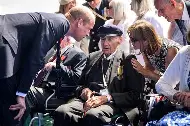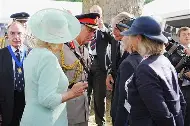Introduction
On the eve of the 80th anniversary of VJ Day — Victory over Japan Day — His Majesty the King delivered a heartfelt tribute to the men and women whose Speaking ahead of a national commemorative service, the King assured veterans, their families, and the nation that their service would “never be forgotten.”
VJ Day, marked annually on 15 August, commemorates the day in 1945 when Japan surrendered to the Allied forces, effectively bringing World War II to a close. While VE Day (Victory in Europe Day) is more widely celebrated in Britain, VJ Day holds profound significance for those whose loved ones fought — and often suffered greatly — in the Far East campaigns.
This year’s anniversary is particularly poignant: not only is it a rare milestone — eight decades since peace was declared — but it may also be the last major commemoration attended by surviving veterans.

The King’s Statement
In a message released from Buckingham Palace, the King praised the “unwavering determination” of the British and Commonwealth forces who fought in the Pacific, from the jungles of Burma to the seas of the South China Sea.
Their courage and fortitude helped secure the peace we enjoy today. They will never be forgotten.”
The King also acknowledged the suffering endured by prisoners of war held by the Japanese, many of whom faced brutal treatment, malnutrition, and forced labour. “Their stories are part of our national memory,” he said.
Historical Context of VJ Day
While Europe celebrated in May 1945, the war continued in the Pacific for another three months. British, Indian, Australian, and other Commonwealth troops were still locked in fierce battles, particularly in Burma (now Myanmar) and on the seas, when the United States dropped atomic bombs on Hiroshima (6 August) and Nagasaki (9 August).
Japan’s surrender was announced on 15 August 1945, and formalised with the signing of surrender documents aboard the USS Missouri on 2 September.
The Far East campaign had been long, exhausting, and often fought in extreme heat, monsoon rains, and disease-ridden environments. Many British families waited years for news of loved ones taken prisoner by the Japanese, not knowing whether they had survived.
The 80th Anniversary Service
This year’s national service will take place at The National Memorial Arboretum in Staffordshire, home to the Far East Prisoners of War Memorial Building. Veterans, families, military leaders, and dignitaries will gather to honour those who served.
The service will include:
A two-minute silence at 11:00 am.
Readings from veterans’ memoirs recounting their experiences.
Laying of wreaths by representatives of Britain, Australia, India, and other Commonwealth nations.
Musical performances by military bands and choirs, including renditions of Abide with Me and Jerusalem.
The King is not expected to attend in person but will be represented by senior members of the Royal Family, continuing a tradition of royal attendance at VJ Day commemorations.
Veterans’ Voices
John Matthews, 101, Burma Campaign Veteran
“When the war in Europe ended, we still had a job to do. We didn’t know how long it would last. The jungle was hot, wet, and full of dangers — but we knew we had to keep going.”
Margaret Hill, Daughter of a Far East Prisoner of War
“My father came home in 1946, weighing less than six stone. He never spoke much about it, but I know it haunted him. These services matter because they acknowledge what they went through.”

Captain Harjit Singh (Retired), Indian Army
“The Indian divisions played a huge role in Burma, and many never returned. I’m glad their contributions are being recognised today.”
The Role of the Commonwealth
The Pacific war was a truly multinational effort. British troops fought alongside forces from:
India: The British Indian Army was the largest volunteer force in history, with millions serving in multiple theatres.
Australia & New Zealand: Their naval and air forces were heavily engaged in the Pacific.
Canada: Contributed airmen and naval support.
The 80th anniversary has sparked renewed calls to ensure the contributions of all Commonwealth nations are fully acknowledged in British war memorials and education.
Prisoners of War and Civilian Suffering
Many were forced to work on projects such as the Burma Railway, made infamous by the film The Bridge on the River Kwai.
Conditions were brutal:
Food shortages and malnutrition were rampant.
Diseases such as malaria, cholera, and dysentery were widespread.
Punishments for perceived disobedience were often severe and violent.
Survivors and historians continue to advocate for education about these atrocities, ensuring that they are remembered alongside battlefield heroism.
Cultural and Educational Legacy
The 80th anniversary has also prompted schools, museums, and heritage groups to create new resources about VJ Day.
Photographs and personal letters from soldiers in Burma.
Oral histories from surviving veterans.
Maps and battle timelines of the final months of the war.
TV documentaries and radio programmes this week will focus on the Pacific campaigns, aiming to bring the lesser-known stories to a wider audience.
The King’s Personal Connection
Historians note that the King’s tribute carries a personal dimension. His late father, Prince Philip, served as a young naval officer in the Pacific during the closing months of the war. The King referenced this indirectly, saying:
“Like many families, mine is deeply aware of the sacrifices made in the Pacific. We remember them with enduring pride.”
International Recognition and Messages
Leaders from Australia, Canada, and India have sent messages of solidarity marking the anniversary.and Allied forces.
Japan’s ambassador to the UK also issued a statement expressing “deep remorse” for the suffering caused during the war and reaffirming Japan’s commitment to peace.
Looking Ahead — Preserving the Memory
With the number of surviving veterans rapidly dwindling, this 80th anniversary is seen as a critical moment to ensure their stories live on. Many are calling for:
Greater inclusion in school curricula of the Pacific war’s history.
Digital preservation of veterans’ testimonies.
Community events that involve younger generations in remembrance.
The Royal British Legion has pledged to continue hosting annual VJ Day services, even as the focus shifts toward intergenerational education and digital archives.
Conclusion
As Britain marks 80 years since VJ Day, the King’s words resonate as both a tribute and a call to remembrance. The heroes of the Pacific, whether they fought in the jungles of Burma, sailed in the Royal Navy, flew in dangerous skies, or endured captivity, helped secure a peace that is too easily taken for granted.
The promise that they will “never be forgotten” is more than ceremonial — it is a commitment to carry their stories forward, to teach future generations about the cost of freedom, and to ensure that the legacy of their courage endures long after the last veterans are gone.



